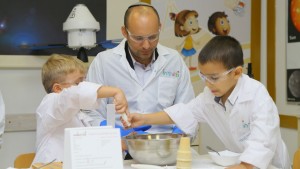 It’s never too early to teach children about robotics, astronomy, computers and outer space.
It’s never too early to teach children about robotics, astronomy, computers and outer space.
Why did global aerospace giant Lockheed Martin send its chief executive to a Beersheva preschool?
Because Lockheed Martin is a major partner in Israel’s first science-technology preschool program, thus far serving 100 children ages three to five. The idea is that it’s never too soon to inculcate the basics of science, technology, engineering and mathematics (STEM) so as to better prepare the next generation for the job market.
“The future growth of Israel’s economy will require a constant supply of highly trained, highly capable technical talent, which is why advancing STEM education is a critical focus for Lockheed Martin,” said Marillyn Hewson, Lockheed Martin chairman, president and CEO.
“We are proud of our collaboration with Israel’s Ministry of Education, Ministry of Science and the Rashi Foundation to promote STEM-related programs for kindergarten through high school students,” said Hewson at the dedication ceremony.
The new early-childhood curriculum was designed to provide 300 hours of science study per year in a stimulating learning environment that allows preschoolers to experiment, experience and develop skills through hands-on creative activities in astronomy, physics, chemistry and robotics.
Over the next three years, the classrooms taking part in the project will be equipped with computers, Lego construction kits, robotics experiments and space-related content to encourage an interest in and a passion for STEM, according to the Rashi Foundation. The joint initiative is part of the MadaKids program that aims to cultivate future scientists in Israel. (“Mada” means “science” in Hebrew.)
To be duplicated across Israel
The project is operated by Beit Yatziv, an organization that runs science education programs for some 40,000 elementary school pupils across Israel on behalf of the Rashi Foundation, including a municipal science excellence center in cooperation with the municipality of Beersheva.
“The participating kindergarten teachers received special training at Beit Yatziv that focused on the science behind natural phenomena such as the seasons, astronomy, robotics and more,” says Maya Lugassi Ben-Hemo, head of pedagogy at Beit Yatziv. “In-service training and academic guidance by Kaye College of Education and the pedagogic team of Beit Yatziv will continue through the school year.”
She emphasizes that the preschoolers won’t lack time to enjoy traditional nursery-school activities such as coloring pictures and building with blocks. “The science and technology program will be integrated within the regular curriculum of the Ministry of Education for science-oriented kindergartens, which obviously includes play time,” she tells ISRAEL21c.
It is hoped that these children will enter elementary school with a deeper understanding of STEM, and that this model for technological preschool education will be duplicated across Israel.
“The kindergarten is intended to serve as a regional learning center for kindergarten teachers, education professionals and parents,” Ben-Hemo tells ISRAEL21c.
Hewson was not the only big name on hand for the dedication of the science preschool. Also in attendance were Minister of Education Naftali Bennett, Beersheva Mayor Rubik Danilovitch, Rashi Foundation Chairman Lt. Gen. (ret.) Gabi Ashkenazi and other dignitaries from Israel and abroad.
“The significance of the knowledge the children gain in preschool will be felt in years to come, and it will surely be highly valuable on the personal as well as the national level,” said Bennett. “Opening the first science kindergarten in Beersheva sends a clear message – that everyone, everywhere in Israel, should have equal opportunities.”
Ashkenazi said that the Rashi Foundation views the promotion of science and technology education from an early age in the geographic and social periphery as a major catalyst for strengthening Israel society and closing educational gaps between the center and periphery of the country.
“The science kindergarten in Beersheva, the capital of the Negev, is an innovative and unique project that will give children an opportunity to cultivate their independent and inquisitive thinking and make an early start on their science education,” Ashkenazi said.
“This is the first step on the path that will lead them, and the country, to new achievements in science and advanced technology. I salute our partners in this cross-sector cooperation – Lockheed Martin, the municipality of Beersheva, the Ministry of Education and Ministry of Science — and hope that the success of the project will lead to the creation of many more kindergartens of this type for the benefit of Israel’s children and Israeli society.”


